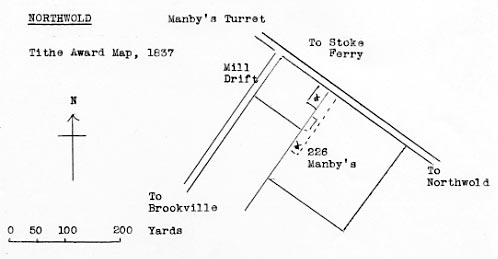You may be interested in an advert I found in The Norwich Mercury dated 12 Aug 1848 referring to the Northwold Post Mill; at least it establishes that Jacob Mason Bird operated the Mill in 1848.
Also, I noticed that Mr Bird's name cropped up a few times in Court Reports. In 1858, he had trouble with a young man called Frederick Youngs whom he employed as a miller in Northwold. Youngs was convicted of theft of some flour, bran and sacks from his master and sentenced to 6 month's imprisonment and hard labour (The Norfolk Chronicle, 30 Oct 1858).
In 1861, Mr Bird was sued for breach of contract to supply 5 tons of bran. The contract price was £5/10/0 per ton, and Mr Bird insisted on cash up front. The plaintiff, George Girling, Merchant of Great Dunham, gave Mr Bird enough sacks for the bran but no cash. When he chased up his order, the price of bran had risen to £7 per ton. He paid up and duly received his bran, but was seeking to reclaim the extra £7/10/0 it had cost him. The Court found in Mr Bird's favour with costs as reported by the Norfolk Chronicle on 20th April, 1861.
More trouble with an employee in 1863: a clerk whom he employed in Downham_Market called Frederick Woodmancey was convicted on four counts of embezzlement, all in the month of June that year, totalling a few pence over £50 (!!) - Goodness knows how he thought he would get away with it! - and was sentenced to nine months hard labour (The Norfolk Chronicle, 8 Aug 1863).
Bird blamed his manager at Downham, Richard Curtis, for not spotting Woodmancey's shenanigans and for not keeping the books accurately; their relationship broke down completely by 3 Jul 1863. Curtis thought he was going to be replaced, so he enquired after a position in Westacre ... Mr Bird found out about this and on 23 Jul gave Curtis written notice to leave at the end of the that quarter of his yearly contract. Curtis protested that his contract required his employer to give him 3 month's notice. Mr Bird seemed to acquiesce: he directed Curtis to report for work daily at Downham from 6 Aug 1863 onwards (but he repossessed the horse and gig that Curtis normally used). Curtis did not report for work at all from 6 Aug onwards, but claimed a quarter's salary in lieu of notice (£47/10/0). Mr Bird opted for the case to be judged by a jury - which was composed of men of similar status as himself: four farmers and an inn keeper. The jury decided in his favour. The judge endorsed their finding and certified costs against Curtis (The Norfolk News, 19 Dec 1863).
Bird took some road contractors to court in 1876 for failing to maintain the Nordelph to Downham road (The Norfolk Chronicle, 12 Feb 1876) presumably what is now Silt Road. The case was adjourned and there is no further mention of it. (I presume that the contractors fixed the road and compensated Mr. Bird for whatever damage his wagon/cart had sustained).
But Bird caused the greatest sensation in 1865: on Mon 15 May, he was charged at the local Magistates Court with using threatening language towards his wife. Early that morning, he had a row with his wife. The commotion drew the attention of their neighbours who protested at his behaviour; apparently he was threatening to shoot his wife. He skedaddled out the back door and took a train to Kings Lynn. A warrant was issued for his arrest. He took the first train back to Downham and was taken to the police station until the Magistrates Court opened at midday. To the frustration of the crowd, his hearing was held in private by one magistrate only. He was bound over himself for £300 with a further bond of £300 to keep his peace towards his wife. To avoid meeting the angry crowd at front of the Courthouse as he left, a couple of "limbs of the law" hoisted him over the back wall to escape across the fields back home. (Full report in The Norfolk Chronicle, 20 May 1865).
Jacob Mason Bird died in 1894. His estate amounted to £21,000 (The Eastern Evening News, 25 Aug 1894). That amounts to £2.194 millions in today's money in terms of comparative Retail Price indices, 1894 and 2016 but a lot more if you factor in relative property prices.
Anthony Coker - 3rd August 2017 |

